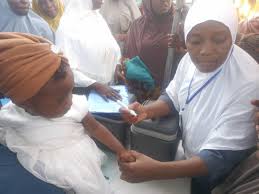
With support from UNICEF, the World Health Organisation (WHO), and other development partners, the Kaduna State Government has kicked off an integrated measles and rubella vaccination campaign aimed at reaching 4.2 million children across its 23 local government areas.
The campaign, launched on Saturday by the Kaduna State Primary Health Care Board, seeks to reduce child mortality and stop the spread of vaccine-preventable diseases among children aged between nine months and 14 years.
Speaking at the flag-off ceremony, the Director of Disease Control and Immunisation, Hamza Ibrahim, said the campaign would significantly reduce the number of “zero-dose” children — those who have never received any vaccination, in the state.
“Kaduna accounts for about 10 percent of the 100 local government areas nationwide battling the zero-dose challenge, with more than 4,000 unvaccinated children identified,” Dr. Ibrahim said.
“Even though our figures are large, the progress we’ve made so far is due to the commitment of community women and the strong support of our development partners.”
He expressed optimism that, with sustained collaboration from UNICEF, WHO, and local health partners such as CHAN and CHI, the state would successfully reach every eligible child.
Also speaking, the State Health Educator, Yusha’u Isah, said the integrated campaign would cover several vaccine-preventable diseases, including measles, rubella, polio, and diphtheria.
“We currently have ongoing diphtheria transmission in more than 19 local government areas, while all local governments have reported measles cases this year,” he revealed.
According to Isah, the campaign is designed to interrupt disease transmission and strengthen children’s immunity, especially in underserved and vulnerable communities. He added that special arrangements had been made to reach children in hard-to-reach, security-compromised areas and Internally Displaced Persons (IDP) camps.
“Our goal is to ensure that no child is left behind, regardless of where they live,” he said.
Health authorities are urging parents and caregivers to present their children for vaccination, noting that immunisation remains one of the most effective ways to protect against preventable childhood diseases.



